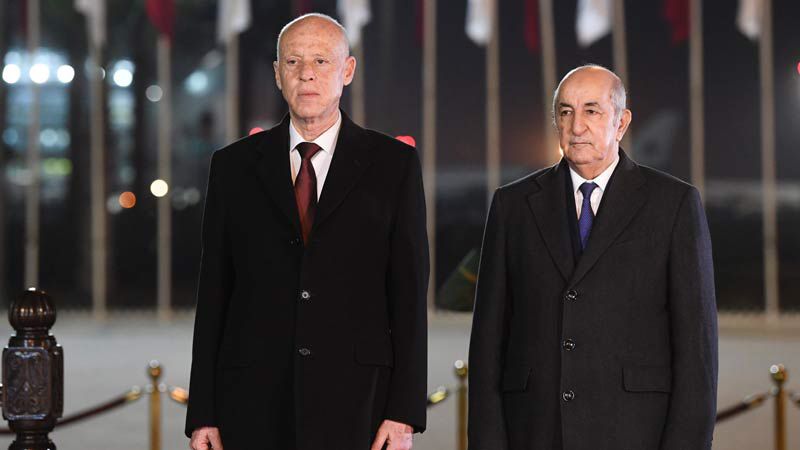The strength of relations between Tunisia and Algeria was demonstrated by Algerian President Abdelmadjid Tebboune’s visit to Tunisia on December 15th-16th, especially given it coincided with escalating tensions between Algeria and Morocco. The visit indicated Algeria’s desire to strengthen its regional alliances to bolster its position in managing its tense relations with Rabat, as well as highlighting the two countries’ common interests regarding developments in Libya, and the need for coordination and cooperation between them in this respect. There are also economic dimensions to this strengthening of bilateral relations, as well as a political dividend for Tunisian President Kais Saied, in enhancing his standing in the face of a domestic political crisis.
Algeria and Tunisia have been recently demonstrating a growing interest in strengthening their bilateral relations, with exchanged visits by Officials from both countries. Algerian Minister of Foreign Affairs Ramtane Lamamra made a number of visits to Tunisia, the most significant of which was on July 27th when he met President Saied and relayed a message from President Tebboune related to relations between the two countries. The visit, which came two days after President Saied suspended Parliament and dissolved the government, seemed to send a message of Algerian support. The visit also came one day after a telephone call between both presidents.
For her part, Tunisian Prime Minister Najla Boden visited Algeria on November 25th. A Tunisian government statement noted, “The visit comes as an affirmation of the strong Tunisian-Algerian relations and a translation of the will of the leaderships of the two countries to advance these relations to a solid and sustainable strategic partnership, in response to the aspirations of the two peoples.” The statement added that the visit was a chance to enhance dialogue and discuss means to support and bolster bilateral cooperation between the two countries, especially through the Tunisian-Algerian Joint Higher Committee to be held in the near future, as well as other joint bilateral sectoral committees.
During President Tebboune’s December visit, the two presidents noted the need to strengthen the close ties between their countries, as reflected in the signing of 27 cooperation agreements.
There are several dimensions and implications to this strengthening of relations between Algeria and Tunisia, including:
Important economic interests: During his visit to Tunisia, President Tebboune expressed his strong interest in advancing bilateral cooperation, leading to economic integration with Tunisia. In the same context, it appears that Tunisia is betting on its relations with Algeria to recover from its economic crisis. This was evident on November 3rd, when Algerian Minister of Energy and Mines Mohamed Arkab held talks with his Tunisian counterpart Nayla Nouira to discuss the possibility of increasing the volume of petroleum products, liquefied natural gas, and butane gas supply to Tunisia. It was also announced on December 14th that Tunisia had obtained a USD 300 million loan from Algeria.
Impact on the Tunisian political crisis: The strengthening of relations between the two countries is not unrelated to political developments within Tunisia. Although Algeria expressed the official position that “what is happening in Tunisia is a domestic matter”, it has intensified its diplomatic contact with the Tunisian leadership over the past months. President Tebboune was the first to contact President Saied after the measures taken by the latter on July 25th, and the two have held several phone calls since then, in addition to the multiple visits by Minister Lamamra to Tunisia.
On December 13th, shortly before the Algerian president’s visit to Tunisia, President Saied announced a number of decisions related to resolving the current political crisis. These included holding a national referendum on constitutional reforms on July 25th, 2022, holding legislative elections on December 17th of the same year, as well as organizing online popular consultations regarding reforms that must be introduced to the country’s existing political system.
The timing of these announcements reflects that the political crisis in Tunisia plays a role in the recent strengthening of relations between the two countries. On the one hand, President Saied seeks Algeria’s support to reduce the severity of external pressures imposed on him as a result of his latest political measures, as well as his need for Algerian economic support. On the other hand, Algeria sought to emphasize its central regional role, and has tried to consolidate, through diplomatic tools, its image as an important party in calming the situation in Tunisia, especially given it is not in its interest to for the crisis to escalate.
Common security concerns: The two countries also have common security concerns, especially potential terrorist threats, in light of reports that ISIS is attempting to revive its influence in the Maghreb region, including the border area between Algeria and Tunisia. In recent months, Tunisian authorities have announced the killing of three terrorists, including a local ISIS leader and an Asian woman who blew herself up in mountainous areas of Kasserine, Tunisia, near the border with Algeria, on April 1st.
Moreover, on August 30th it was announced that Tunisian authorities handed over Suleiman Bouhafs to Algeria. Bouhafs, who was sentenced to prison, is a member of the Movement for Self-Determination in Kabylia (MAK), classified by Algerian authorities as a terrorist organization.
Strengthening Algeria’s position vis-a-vis Morocco: The Algerian-Tunisian rapprochement is also linked to the current crisis in Moroccan-Algerian relations, which culminated in Algeria’s announcement on August 24th of its severing of diplomatic ties with Morocco, accusing it of “continuing acts of hostility against Algeria”. President Tebboune announced on October 31st that Algeria would not renew the contract to use the pipeline that supplies Spain with Algerian gas through Morocco. In this context, Algeria seeks to bolster its relations with Tunisia with the aim of forming an alliance through which relations with Morocco can be managed.
Expanding the scope of coordination on Libya: The Libyan issue is of particular importance in Tunisian-Algerian relations, given that developments there have direct repercussions on the two countries’ security and interests, in particular the issues of smuggling and organized crime, and rising terrorist activities in both countries, originating from Libya. Accordingly, the Libyan issue was discussed during President Tebboune’s visit to Tunisia, especially given the visit came days before the planned presidential elections in Libya on December 24th, which were eventually delayed. President Saied stated on December 15th that, “There is always coordination with Algeria on Libya,” while President Tebboune declared that he had “exchanged visions with his Tunisian counterpart on a set of regional issues, especially on Libya,” adding, “We hope that Libya will get rid of mercenaries, and that harmony will return between Libyans.”
While there has historically been Algerian-Tunisian cooperation, the current regional context is giving bilateral relations a new momentum, especially given the various common interests between the two countries at the present time. These include the developments in Libya and the security threats associated with them, in parallel with Algeria’s efforts to emphasize its regional role and openness to various parties through which it can manage its tense relations with Morocco and France, in addition to Tunisia’s attempts to attract Algerian support in its internal political and economic crisis.


